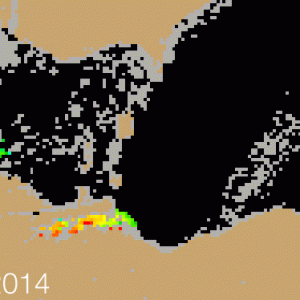Federal Water Tap, September 22: America’s Spies Warn of Water and Climate Risks
The potential for violence, conflict, and government upheaval arising from natural resource scarcity and a warming planet continues to catch the eye of America’s top spooks.
“Competition for scarce resources, such as food, water, or energy, will likely increase tensions within and between states and could lead to more localized or regional conflicts, or exacerbate government instability,” according to the National Intelligence Strategy, which outlines priorities for analysts and spies for the next four years.
That skeletal sentence has been given flesh in other reports and strategy documents, notably the assessment of global security threats, a document delivered annually to Congress by the director of national intelligence.
The 2014 threats assessment dedicated a section to water threats, citing the Middle East, North Africa, and South Asia as regions with the least capacity to adapt to a warming world because of poverty and large populations.
Algae in Congress
Rep. Marcy Kaptur, an Ohio Democrat whose district is a 227-kilometer (141-mile) slice of Lake Erie coastline, introduced a bill addressing the lake’s now-notorious algae problem.
The Safe and Secure Drinking Water Act requires the administrator of the U.S. Environmental Protection Agency to publish recommendations – not regulations – for levels of microcystins, the toxic component of some algal blooms, in drinking water, as well as suggested procedures for testing and treating affected waters.
With mid-term elections in six weeks and Congress adjourned until mid-November to focus on campaigns, the bill has almost no chance of being taken up this session.
More Algae in Congress
Michigan’s U.S. senators announced a $US 653,000 grant to the University of Michigan to develop tools for forecasting algae blooms in the Great Lakes.
Water from Mexico
The Texas congressional delegation sent a letter to President Obama asking him to intervene in a water dispute with Mexico, according to the Brownsville Herald.
Under a 1944 treaty, Mexico is required to release a certain volume of water over a five-year period into the Rio Grande, which forms part of the U.S. southern border. Mexico is currently behind on its obligations and has until October 2015 to catch up.
Marcellus Shale
A Department of Energy research lab found no upward movement of methane or brine from six natural gas wells in Pennsylvania’s Marcellus shale formation, a drilling hotspot.
The study of a single drilling site did not find evidence of gas or salty water from the Marcellus layer moving through geologic fissures and into gas wells located in a rock layer 3,800 above the Marcellus.
California Drought Bill
California’s congressional delegation has been tight-lipped about negotiations over a compromise drought bill. Sen. Barbara Boxer told McClatchy news service that the negotiations have a “55 to 60 percent chance” of success.
Salmon and Drought
The Bureau of Reclamation discovered a parasite in salmon living in the lower Klamath River in California. Seeking to avoid a massive fishkill as happened in 2002, the bureau doubled for a week the amount of water released from one of the basin’s dams.
The higher flows, which will cut into water storage at Lewiston Dam, now two-thirds of its historic average, will end Tuesday. Warm water, low flows, and streams crowded with salmon contribute to the parasite’s growth. The release adds more cold water to the river.
Superfund
Five new sites were added to Superfund, the list of hazardous waste sites receiving federal attention. Two of the newcomers – in Indiana and Pennsylvania – represent groundwater contaminated by solvents and volatile organic compounds, respectively. The source of pollution for both sites is not known.
Drinking Water Advisory Council
Algae blooms, regulating groups of chemicals rather than case by case, and climate issues will be on the agenda for the next meeting of the EPA’s drinking water advisory group. The meeting, open to the public, will be held November 6 and 7 in Washington, D.C. To attend, email Simon.Roy@epa.gov by October 17.
Federal Water Tap is a weekly digest spotting trends in U.S. government water policy. To get more water news, follow Circle of Blue on Twitter and sign up for our newsletter.
Brett writes about agriculture, energy, infrastructure, and the politics and economics of water in the United States. He also writes the Federal Water Tap, Circle of Blue’s weekly digest of U.S. government water news. He is the winner of two Society of Environmental Journalists reporting awards, one of the top honors in American environmental journalism: first place for explanatory reporting for a series on septic system pollution in the United States(2016) and third place for beat reporting in a small market (2014). He received the Sierra Club’s Distinguished Service Award in 2018. Brett lives in Seattle, where he hikes the mountains and bakes pies. Contact Brett Walton





Leave a Reply
Want to join the discussion?Feel free to contribute!